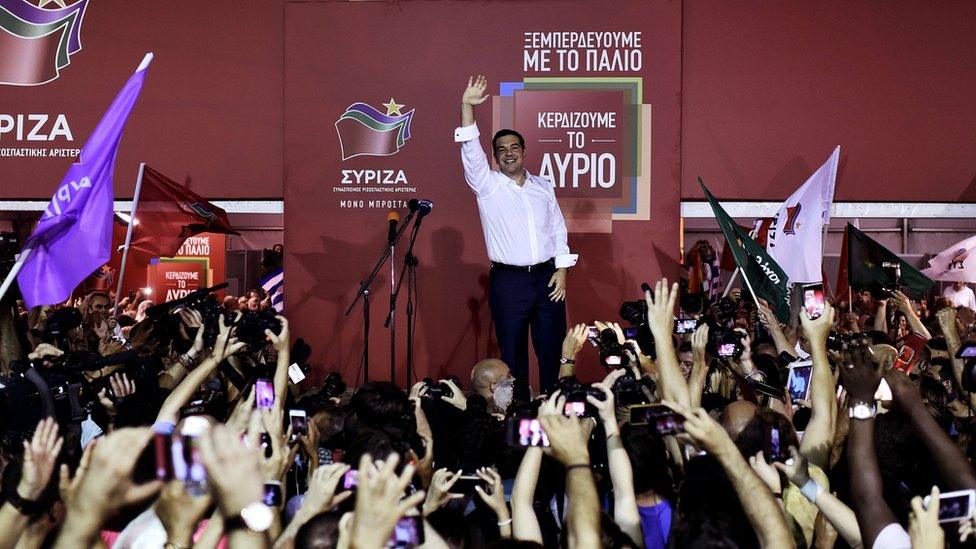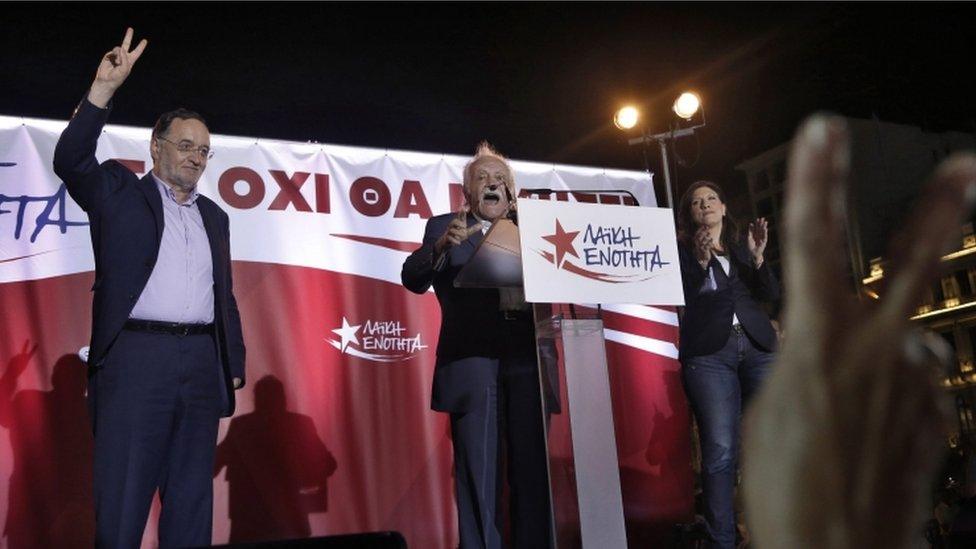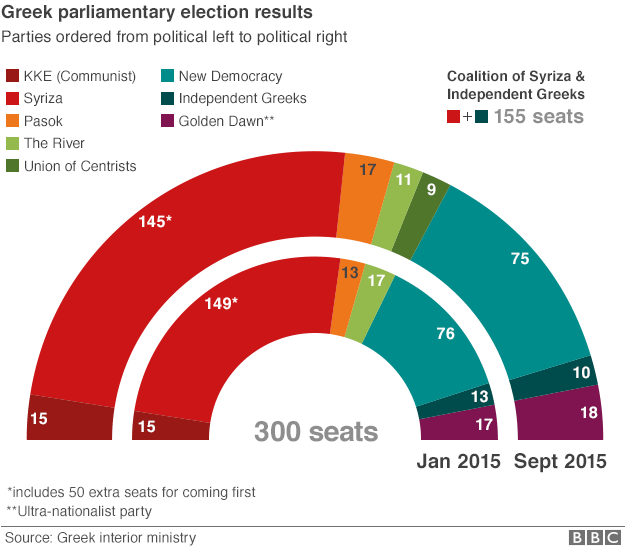Greek election: What was the point?
- Published

Alexis Tsipras is now free of many of the Syriza dissidents who voted against his eurozone bailout
Alexis Tsipras's electoral gamble has paid off. For the third time in a year, he has secured the support of Greek voters.
But was it worth another period of political instability in Greece?
Here are six things we have learned from the vote.

Greeks still trust Tsipras
You could be forgiven for wondering why Greeks rejected the terms of a 5 July bailout only to vote Alexis Tsipras back into power - even though he agreed to another tough austerity package only last month.
That July referendum, when 61% of voters backed the Syriza leader's rejection of the eurozone terms, was probably more pointless than the September election, as all it told us was that most Greeks approved of his handling of debt talks.
The latest vote has revealed that, despite the exhaustive list of reforms that Mr Tsipras has signed up to, Greeks still want his leftist party in power. They trust him to secure the debt relief he has promised to push for, when the bailout comes up for review by Greece's creditors in the next few weeks.

Tsipras survived far-left revolt
One of the reasons Mr Tsipras called elections was that he had lost his majority in parliament, and his credibility with the far left of his own party was damaged.
Dozens of his own MPs had refused to back Greece's third eurozone bailout and 25 of those far-left dissidents abandoned the party to form the third biggest group in parliament, Popular Unity, external.
These included ministers such as Panagiotis Lafazanis and influential parliament speaker Zoe Kostantopoulou.

The far-left wing of Syriza, which formed a new party, will now have to fight the government from outside parliament
Now the Syriza leader is back with almost as many MPs as before and Popular Unity has failed to have any of its 25 MPs elected.
Although many in his party resent the terms of the bailout, Alexis Tsipras has freed himself of the most hardened opponents and moved his left-wing party closer to the centre.

Far right are still on the march
With 7% of the vote and 18 MPs in the new parliament, Golden Dawn are the third biggest force in Greek politics, after Syriza and New Democracy.

Golden Dawn leader Nikos Michaloliakos
They have increased their share of the vote from January, even though most Golden Dawn leaders are on trial, in connection with the murder of anti-racist rapper Pavlos Fyssas by a Golden Dawn supporter.
Party leader Nikos Michaloliakos said Golden Dawn's result was particularly significant as "we had an entire system against us".
Support for the far right was most visible among those hardest hit by Greece's economic crisis. More than 16% of Greece's unemployed backed Golden Dawn.
There was also a small spike of support in some of the eastern islands hit by the migrant crisis. With the overall turnout down, it is worth noting that the number of Golden Dawn votes fell just below 380,000, lower than in January and in 2012, when the party also won 18 seats.

Greeks are fed up with voting
Turnout was below 57%, well down on the 63% who voted in the July referendum and the January election.
One polling station in Athens reported only 25 voters during a three-hour period.
Although the declining turnout fits into a trend in Greece - in 2007 three-quarters of the electorate voted - the latest figures suggest Greeks have become weary of being sent back to the ballot box.

January's poll was a momentous toppling of Greece's accepted political order and July's referendum came at a decisive time for Greeks as they struggled with capital controls that had shut their banks.
But Sunday's vote had none of that excitement.

On many islands the poll was overshadowed by the migrant crisis
Turnout was even lower on the eastern islands near the Turkish coast which have been hardest hit by the influx of migrants.
Only 43% of voters turned out on Lesbos, which saw 50,000 migrants arrive last month alone.
For many Greeks, who have watched their shores become a transit point for 300,000 people trying to get to northern Europe, the election was secondary to the crisis on their doorstep.
But on the mainland migration was not a major issue in the campaign.

Tens of thousands of migrants and refugees have made the hazardous trip from Turkey to Lesbos in recent weeks

Take Greek opinion polls with a pinch of salt
In the run-up to election day, Greeks were being told that Syriza and New Democracy were running neck and neck, at around 31%.
Syriza's eventual margin of victory was 7% - narrower than in the January election but not by much.
Greeks were also told ahead of the 5 July referendum on the eurozone bailout that the vote was too close to call, with the Yes and No campaigns both running at around 45%. In the event, the No's had it, by a comfortable margin of 61.3% to 38.7%.

New Greek government priorities
In first 100 days: Cut wage and pension costs again, but less than in previous five years (2% increase in workers' pension contributions, 2% increase in pensioners' national insurance contributions)
Reform early retirement: Decide which categories will qualify for it (and revamp whole pension system before January)
Recapitalise banks and set timetable for lifting capital controls
Hold more talks on debt repayments with EU-IMF lenders (to be ready to negotiate debt relief in January - though some EU governments oppose that)
Adopt more tax reforms: farmers to see income tax double and fuel subsidy scrapped; new penalties for tax evasion (VAT increase was passed in July; corporation tax was raised by 3%, to 29%)
Privatise more than half of state electricity network (regional airports and much of road network already privatised)
Liberalise closed professions, eg removing taxi drivers' fixed tariffs
Reinstate charges in state health service that Syriza scrapped (eg €5 charge for visit to doctor)
(Source: Dimitrios Syrrakos, Manchester Metropolitan University)